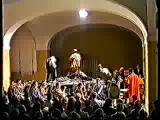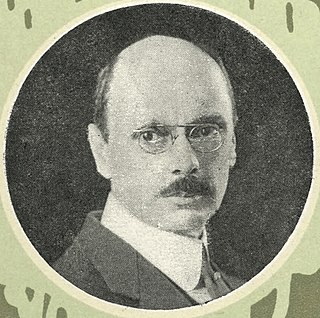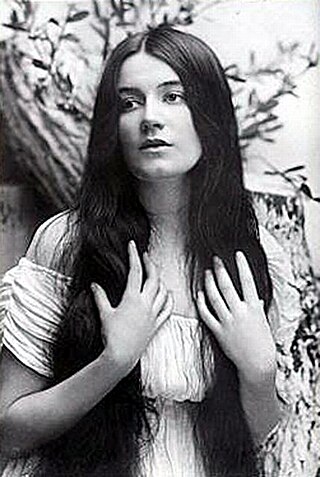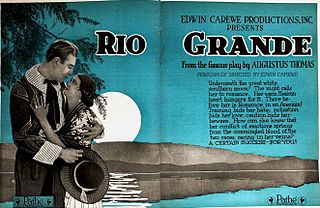Related Research Articles

Ferguson Wright Hume, known as Fergus Hume, was a prolific English novelist, known for his detective fiction, thrillers and mysteries.

Friedrich Carl Georg Kaiser, called Georg Kaiser, was a German dramatist.

Karlheinz Martin was a German stage and film director, best known for his expressionist productions.

The Survival of St. Joan is a rock opera by Smoke Rise from an original concept and libretto by Off-Broadway playwright and screenwriter James Lineberger.

William Joseph Lincoln was an Australian playwright, theatre manager, film director and screenwriter in the silent era. He produced, directed and/or wrote 23 films between 1911 and 1916.

Eulalie Jensen was an American actress on the New York stage and in silent films.

Der Kaiser von Atlantis oder Die Tod-Verweigerung is a one-act opera by Viktor Ullmann with a libretto by Peter Kien. They collaborated on the work while interned in the Nazi concentration camp of Theresienstadt (Terezín) around 1943. The Nazis did not allow it to be performed there.

Expressionism was a movement in drama and theatre that principally developed in Germany in the early decades of the 20th century. It was then popularized in the United States, Spain, China, the U.K., and all around the world. Similar to the broader movement of Expressionism in the arts, Expressionist theatre utilized theatrical elements and scenery with exaggeration and distortion to deliver strong feelings and ideas to audiences.

George Howard Clutsam was an Australian pianist, composer and writer, best remembered as the arranger of Lilac Time. Clutsam published over 150 songs.

Violet Hopson was an actress and producer who achieved fame on the British stage and in British silent films. She was born Elma Kate Victoria Karkeek in Port Augusta, South Australia on 16 December 1887. Violet Hopson was her stage name, while in childhood she was known as Kate or Kitty to her family.

Captain Midnight, the Bush King is a 1911 Australian silent Western film about the fictitious bushranger Captain Midnight. It was the directorial debut of actor Alfred Rolfe. The film is based on the play of same name by W. J. Lincoln and Alfred Dampier. Captain Midnight, the Bush King is now considered lost.
The bushranger ban was a ban on films about bushrangers that came in effect in Australia in 1911–12. Films about bushrangers had been the most popular genre of local films ever since The Story of the Kelly Gang (1906). Governments were worried about the influence this would have on the population and bans against films depicting bushrangers were introduced in South Australia (1911), New South Wales and Victoria (1912).

From Morn to Midnight is a 1920 German silent expressionist film directed by Karlheinz Martin based on the 1912 play From Morning to Midnight by Georg Kaiser. It is one of the most radical films of the German Expressionist movement.

Margaret McWade was an American stage and film actress. She began her career in vaudeville in the early 1890s. Her most memorable role was as one of The Pixilated Sisters, a comedic stage act with actress Margaret Seddon. Later in 1936, they reprised their roles in the movie Mr. Deeds Goes to Town.
Roma Bahn (1896–1975) was a German stage and film actress. On stage she was notable for her performances as Polly in the original 1928 production of The Threepenny Opera. In cinema she played supporting roles in films made during the Weimar and Nazi eras.

Allan Sears was an American film actor who played leading roles in the 1910s and 1920s before transitioning into character roles in the 1930s. He was noted for his tall stature.
Fanny Simonsen, also written Fannie Simonsen, was a French soprano singer who had a substantial career on the Australian stage, later a concert manager with her violinist husband Martin Simonsen. Several daughters and one grand-daughter, Frances Alda, were first-rate singers.
Wilton Welch was an Australian comic actor and dramatist, husband and collaborator of Louise Carbasse, best known as Louise Lovely.
Jack Haskell was an American theatrical producer who specialised in revue, later a dance director in Hollywood. Much of his early work was for J. C. Williamson's (JCW) in Australia.
Fanny Emily Mary Hooper, known as Minnie Hooper, was an Australian dance instructor and ballet mistress. She has been credited, with Jennie Brenan and Minnie Everett, with maintaining the high standard of Australian dance and ballet in the 1920s, between the reigns of Emilia Pasta and Anna Pavlova. She had a long series of contracts with J. C. Williamson's and conducted classes at her dance studio on Pitt Street, Sydney.
References
- ↑ "German Play for London". The Telegraph (Brisbane) . No. 14, 828. Queensland, Australia. 5 June 1920. p. 14. Retrieved 29 September 2022– via National Library of Australia.
- ↑ "Stage Gossip". The Argus (Melbourne) . No. 23, 213. Victoria, Australia. 25 December 1920. p. 5. Retrieved 28 September 2022– via National Library of Australia.
- ↑ Hemus, Ruth; Preece, Julian (2013). 'From Morning to Midnight' Programme.
- ↑ "From Morning to Midnight - review" . Retrieved 23 November 2020.
- ↑ "From Morning to Midnight Cast & Creative". Archived from the original on 11 January 2014. Retrieved 4 January 2014.